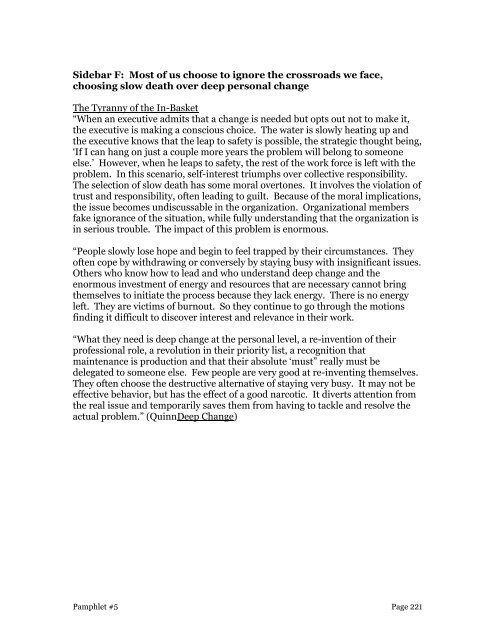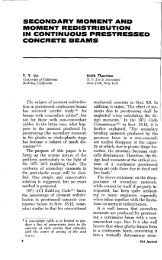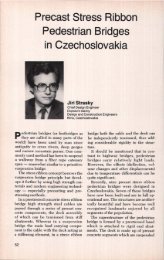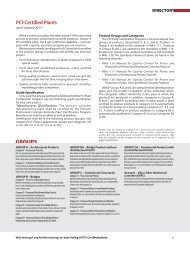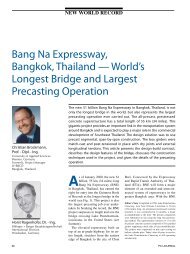Winning Without Competition: How to Break Out of a Commodity ...
Winning Without Competition: How to Break Out of a Commodity ...
Winning Without Competition: How to Break Out of a Commodity ...
You also want an ePaper? Increase the reach of your titles
YUMPU automatically turns print PDFs into web optimized ePapers that Google loves.
Sidebar F: Most <strong>of</strong> us choose <strong>to</strong> ignore the crossroads we face,<br />
choosing slow death over deep personal change<br />
The Tyranny <strong>of</strong> the In-Basket<br />
“When an executive admits that a change is needed but opts out not <strong>to</strong> make it,<br />
the executive is making a conscious choice. The water is slowly heating up and<br />
the executive knows that the leap <strong>to</strong> safety is possible, the strategic thought being,<br />
‘If I can hang on just a couple more years the problem will belong <strong>to</strong> someone<br />
else.’ <strong>How</strong>ever, when he leaps <strong>to</strong> safety, the rest <strong>of</strong> the work force is left with the<br />
problem. In this scenario, self-interest triumphs over collective responsibility.<br />
The selection <strong>of</strong> slow death has some moral over<strong>to</strong>nes. It involves the violation <strong>of</strong><br />
trust and responsibility, <strong>of</strong>ten leading <strong>to</strong> guilt. Because <strong>of</strong> the moral implications,<br />
the issue becomes undiscussable in the organization. Organizational members<br />
fake ignorance <strong>of</strong> the situation, while fully understanding that the organization is<br />
in serious trouble. The impact <strong>of</strong> this problem is enormous.<br />
“People slowly lose hope and begin <strong>to</strong> feel trapped by their circumstances. They<br />
<strong>of</strong>ten cope by withdrawing or conversely by staying busy with insignificant issues.<br />
Others who know how <strong>to</strong> lead and who understand deep change and the<br />
enormous investment <strong>of</strong> energy and resources that are necessary cannot bring<br />
themselves <strong>to</strong> initiate the process because they lack energy. There is no energy<br />
left. They are victims <strong>of</strong> burnout. So they continue <strong>to</strong> go through the motions<br />
finding it difficult <strong>to</strong> discover interest and relevance in their work.<br />
“What they need is deep change at the personal level, a re-invention <strong>of</strong> their<br />
pr<strong>of</strong>essional role, a revolution in their priority list, a recognition that<br />
maintenance is production and that their absolute ‘must” really must be<br />
delegated <strong>to</strong> someone else. Few people are very good at re-inventing themselves.<br />
They <strong>of</strong>ten choose the destructive alternative <strong>of</strong> staying very busy. It may not be<br />
effective behavior, but has the effect <strong>of</strong> a good narcotic. It diverts attention from<br />
the real issue and temporarily saves them from having <strong>to</strong> tackle and resolve the<br />
actual problem.” (QuinnDeep Change)<br />
Pamphlet #5 Page 221


